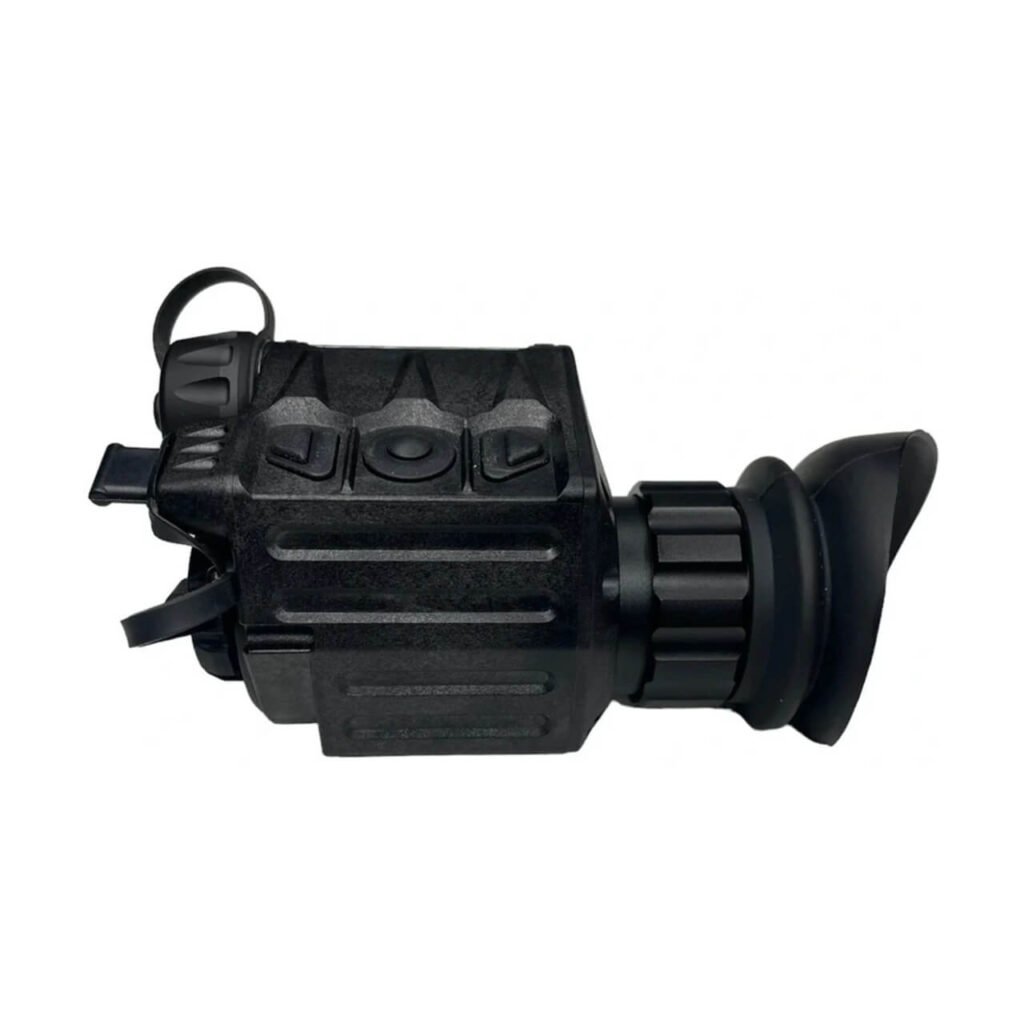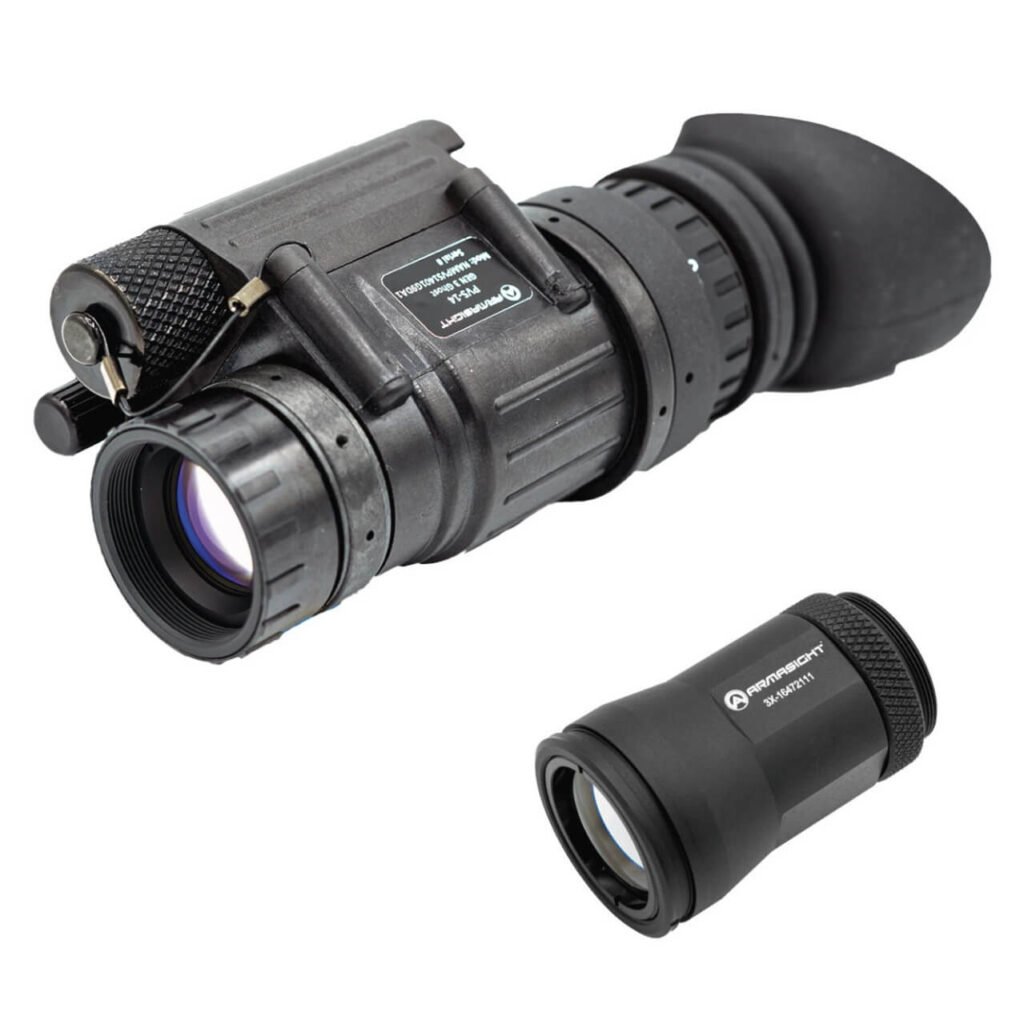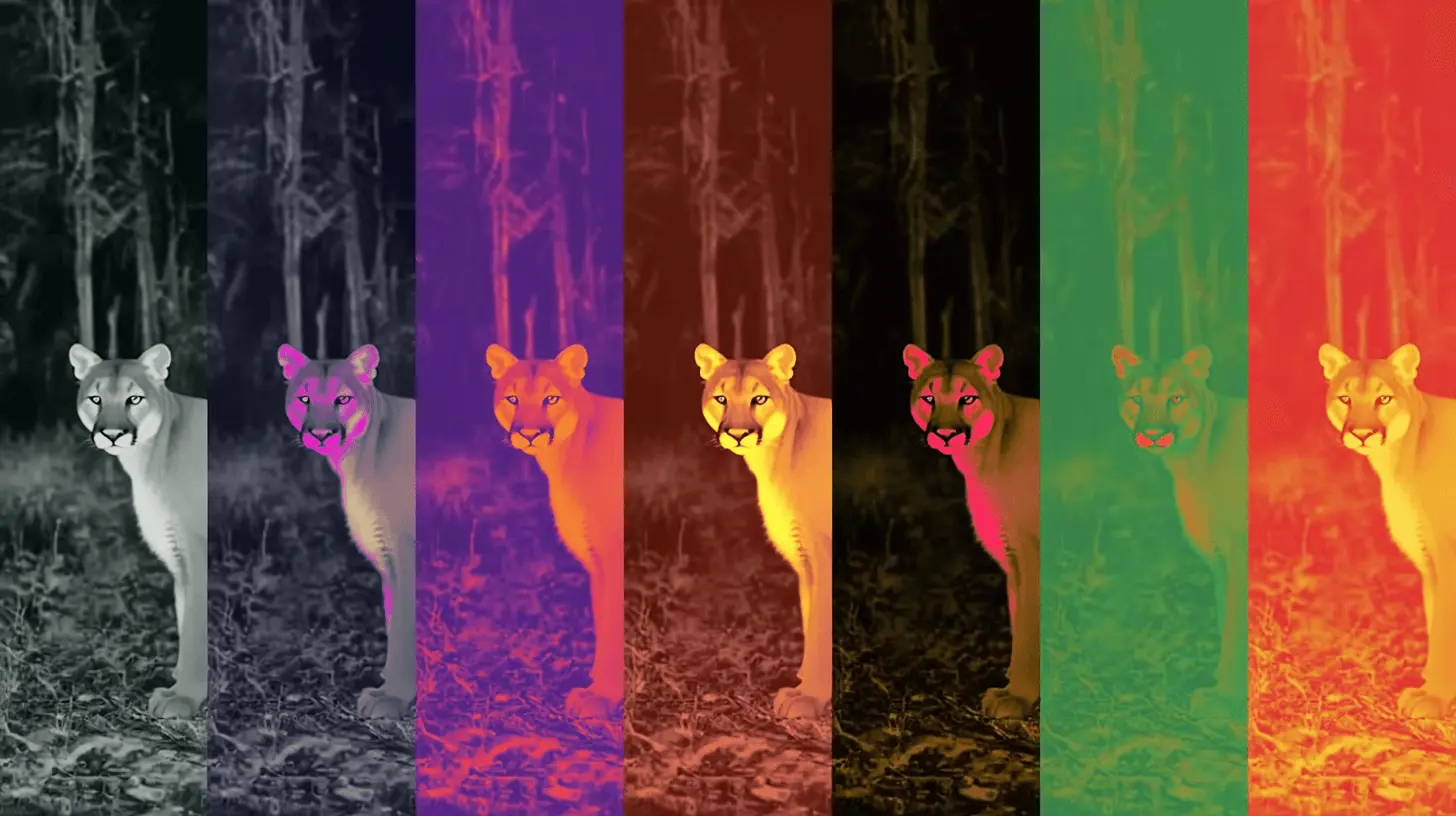How Night Vision Monoculars Work
The best night vision monoculars operate by converting minimal light into clear visibility through infrared illuminators and precise optical amplification. Each monocular captures faint ambient light, magnifies it, and translates it into a visible image using a digital night vision sensor. This combination of optics and electronics defines the night vision market, where clarity and reliability matter most for every user.
Infrared Light Basics
Infrared light sits just beyond the visible spectrum. While night vision binoculars use comparable technology, monoculars maintain a clear advantage in weight, portability, and cost. The infrared illuminator’s wavelength directly affects viewing range and clarity, which are important details when comparing Gen 1, Gen 2, or Gen 3 optics.
How IR Illumination Creates Visibility
When the infrared illuminator activates, reflected light reaches the sensor, which converts it into an electrical signal. The objective lens and eyepiece then display an amplified image with proper brightness and contrast. This process provides consistent visibility whether the user is tracking wildlife or navigating dark terrain.
A solid grasp of these optical fundamentals helps shooters and field operators evaluate infrared systems against more specialized options like thermal imaging.
Infrared vs Thermal Imaging: What’s the Difference?
Infrared monoculars enhance available light, while thermal monoculars detect heat signatures. Understanding this difference is essential when selecting night vision devices in 2025.
Infrared Light vs Heat Detection
Infrared optics depend on reflected light from a target, whereas thermal imaging detects emitted heat signatures. Hunters, law enforcement, and security professionals favor thermal imaging for identifying warm bodies through brush, smoke, or fog. Conversely, infrared monoculars provide detailed image recognition, making them useful for navigation and surveillance tasks.
Practical Use Cases for Each Technology
In nighttime search and rescue operations, thermal monoculars typically outperform traditional optics. For precision spotting or outdoor activities, night vision monoculars offer sharper image detail and a wide field of view.
Buyers comparing both types often weigh cost against premium price tags, noting that Gen 3 night vision models frequently achieve the ideal balance between brightness, performance, and build quality.
Optical and Sensor Technology Explained
Modern night vision monoculars integrate high-grade analog optics with efficient digital processing. A CMOS sensor converts captured light into signals, which a digital signal processor refines for optimal image quality. The objective lens size and magnification factor directly influence clarity and effective viewing range.
From Ambient Light to Clear Vision: How It Works
The CMOS sensor translates light into electrical data and instantly delivers it to a digital device for processing. In advanced digital monoculars, this allows photo and video recording capabilities. The Bushnell Equinox exemplifies this innovation through wireless streaming and extended battery life, combining field performance with modern convenience.
How Far Can You See and What’s the Trade-Off?
Optical magnification impacts both scale and light transmission. Higher zoom reduces the field of view, while lower magnification improves image sharpness. Modern digital zoom features in NV monoculars such as the Night Owl Optics line give users flexibility between reach and definition. Balancing zoom with clarity remains key, especially for shooters and observers who value situational awareness.
Key Buying Factors: Battery, Durability, and Field Use
The best night vision monoculars achieve an effective compromise between performance and practicality. Whether evaluating a best budget choice or a premium setup, understanding specifications like battery life, lens quality, and durability ensures a dependable field companion.
Battery Life That Lasts in the Field
Power-efficient designs extend battery life and reduce downtime during extended operations. Units featuring built-in rechargeable power cells are especially valuable in harsh or cold environments. The Bushnell Equinox and Nightfox 110R stand out for their long runtime and compact, lightweight configurations, important traits in tactical or expeditionary use.
Built to Withstand Rain, Dust & Impact
A waterproof housing protects electronic components from dust and moisture, maintaining operational integrity in demanding environments. Rugged build quality distinguishes field-rated optics from consumer-grade versions, making construction a top consideration for tactical or hunting gear applications.
Designed for Real-World Adventures
Functional accessories like tripod mounts, headgear adapters, and lightweight form factors enhance user comfort in the field. A wide field of view and dependable scope alignment further improve scanning efficiency. For users exploring night vision without spending heavily, best budget monoculars deliver solid versatility at a reasonable price point.
Top Night Vision Monoculars in 2025
Below are top-rated night vision monoculars across Gen 1, Gen 3, digital, and thermal categories. This includes established brands like Armasight, ATN, AGM, and Bushnell, each offering distinct advantages depending on your needs and budget.
| Model | Type | Highlights | Use Case | Price |
|---|---|---|---|---|
| Armasight PVS-14 Gen 3 | Military-Grade NV Monocular | Auto-gated tube, 40° FOV, multi-mountable design | Tactical, security, field ops | $4,499 |
| Armasight Sidekick 320 Mini | Thermal Monocular | 12μm thermal sensor, 60Hz, IP67, 3 button control | Thermal detection, wildlife, S&R | $1,999 |
| AGM PVS-14 Gen 3 | Military-Grade Monocular | Advanced Gen 3 clarity for tactical operations | Defense, security | $3,500+ |
| Bushnell Equinox Z2 | Digital Monocular | Built-in IR, Wi-Fi, video recording | Wildlife observation, navigation | $350 |
| SiOnyx Aurora Pro | Digital NV Device | Full-color night vision, photo and video | Boating, security | $1,000 |
| ATN NVM14 Gen 3 | NV Monocular | Auto-gating, enhanced image quality | Hunting, big game spotting | $3,000 |
| CREATIVE XP Elite | Digital Monocular | Long-range infrared, improved battery life | Beginners, camping | $200 |
Ready to Compare the Best Night Vision Monoculars?
Armasight’s Gen 3 and thermal monoculars are trusted by professionals, hunters, and tactical users for a reason. Rugged. Reliable. Made for real-world conditions.
Armasight vs AGM vs ATN: Which Night Vision Brand Stands Out?
Choosing the right brand depends on your priorities, whether it’s field-proven reliability, budget-conscious optics, or advanced tech. Here’s how Armasight, AGM, and ATN compare:
| Brand | Strengths | Best For |
|---|---|---|
| Armasight | U.S.-built, Gen 3 optics, thermal options, MIL-SPEC ruggedness | Tactical professionals, security, S&R |
| AGM Global Vision | Affordable Gen 2+ and Gen 3 monoculars with solid specs | Entry-level tactical, budget buyers |
| ATN Corp | Innovative digital features, smart integration, hybrid use (day/night) | Tech-savvy users, hunters, casual use |
Quick Tip: If you’re shopping for rugged Gen 3 performance or thermal capability, Armasight is the go-to. For smart features like video streaming and digital sensors, ATN delivers. AGM is ideal when you want reliability without a steep price tag.
Armasight Night Vision and Thermal Monoculars
Armasight is a respected U.S.-based manufacturer of night vision and thermal optics, known for delivering durable, mission-ready gear for both civilian and tactical applications.
Armasight Sidekick 320 Mini Thermal Monocular
A compact, professional-grade thermal monocular, the Sidekick 320 is designed for fast, accurate target acquisition in complete darkness. Its 12-micron sensor and 60 Hz refresh rate offer smooth, real-time thermal imaging. Built with IP67-rated housing and extended battery performance, it’s ideal for hunters, search and rescue teams, and security professionals who need rugged portability without sacrificing clarity.

Armasight PVS-14 Gen 3 Monocular
A benchmark in Gen 3 night vision, the PVS-14 offers exceptional clarity and operational flexibility. Featuring an auto-gated image intensifier tube, wide 40° field of view, and lightweight design, it’s compatible with headgear, helmets, and weapons. Designed and assembled in the U.S., it meets the demands of law enforcement, military, and serious outdoor users.

If you’re investing in night vision for tactical use, surveillance, or rugged field conditions, the Armasight PVS-14 delivers long-term performance with Gen 3 clarity. For those exploring thermal detection, the Sidekick 320 offers advanced sensor performance in a compact form.
Quick Recommendation
For most users entering night vision, the Armasight PVS-14 remains a proven standard for reliability and image fidelity. The Sidekick 320 gives you access to professional-grade thermal capability in a portable format. Both models deliver strong long-term value without unnecessary complexity.
Where to Buy and What to Avoid
Trusted Retailers
Reputable outlets such as OpticsPlanet, Cabela’s, and B&H Photo offer verified night vision monoculars. These retailers often bundle compatible hunting gear, providing complete kits ready for the field. Buying directly from manufacturers like Armasight also ensures warranty coverage and authentic components.
Common Product Pitfalls
Avoid counterfeit or unbranded imports that compromise sensor precision and optical clarity. Informed buyers who understand the differences between infrared and thermal imaging make better long-term gear choices.
With proper research and sourcing, a compact monocular becomes a lasting investment for wildlife observation, big game hunting, or tactical surveillance.
Night vision monoculars are often part of a broader tactical or preparedness setup. If you’re assembling a field-ready loadout, be sure to include a reliable IFAK (Individual First Aid Kit) — essential gear that complements any nighttime or low-visibility mission.
Whether you’re expanding your gear for night hunting or stepping into thermal for the first time, Armasight’s Gen 3 and thermal monoculars deliver performance backed by robust design and U.S. quality control.
Frequently Asked Questions
Can infrared monoculars be used during the day?
Most digital infrared monoculars can operate safely in daylight. Analog Gen 1 or Gen 3 optics, including the Armasight PVS-14, should only be used in low-light conditions to protect the image tube.
Are Gen 3 monoculars legal to own in the United States?
Yes. Civilian ownership of Gen 3 night vision equipment is legal within the U.S., though export is restricted under ITAR regulations.
What is the difference between thermal and infrared night vision?
Thermal monoculars detect heat signatures. Infrared monoculars amplify ambient light. The Armasight Sidekick 320 is a thermal device, while the PVS-14 uses traditional infrared image intensification.
How far can night vision monoculars see?
Typical digital night vision monoculars offer a viewing range of 100 to 200 meters. Advanced Gen 3 monoculars, such as the Armasight PVS-14, can reach distances of over 300 meters in ideal low-light conditions, like starlight or moonlight, depending on the ambient light and environmental factors.
Ready to explore more options?
Armasight’s thermal and night vision lineup continues to set the standard for field-ready performance and long-term reliability. Whether you’re upgrading or entering night optics for the first time, Armasight models are a dependable place to start.
Explore Armasight Monoculars



